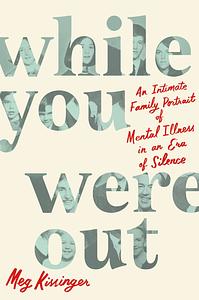You need to sign in or sign up before continuing.
Take a photo of a barcode or cover
890 reviews for:
While You Were Out: An Intimate Family Portrait of Mental Illness in an Era of Silence
Meg Kissinger
890 reviews for:
While You Were Out: An Intimate Family Portrait of Mental Illness in an Era of Silence
Meg Kissinger
challenging
dark
emotional
informative
sad
medium-paced
dark
emotional
funny
sad
tense
medium-paced
emotional
reflective
medium-paced
challenging
dark
emotional
hopeful
informative
reflective
sad
medium-paced
I knew from history classes that I am lucky to have been born when I was as a mentally ill person. The psychiatric institutions are a low point in our country's history. However, what I hadn't really thought about or known much about was this awful period that Meg Kissinger's family lived through between when we let people out of institutions and invented some of the drugs I'm on. Meg loses two family members to suicide during the 60s and 80s (I think. I was a little unclear on when somethings in the book actually happened at times). Her siblings bounced back and forth into and out of mental hospitals for short stays, visited therapists but then refused to go back, tried to kill themselves repeatedly, and eventually succeeded. Meg writes their story with care and compassion, and also writes the story of the surviving siblings and their father, an also mentally ill alcoholic. The story was well written and thoughtful, and tries to write the pain of the suicidal person without externalizing it while also writing the pain of the survivor. It was really a remarkable book and I'm sad that I can't spend more time in Meg's family.
challenging
dark
emotional
informative
reflective
sad
medium-paced
I don’t usually read memoirs but this one was about mental health and I have always been drawn to psychology. Wow. I could relate to this family more than I expected and we are all the same-trying to survive. The focus is mainly on the author’s life but she was an investigative journalist who did uncover some of the flawed systems In place for mental health. Our world has such a long way to go…but it starts with loving our own families and that’s what I think is truly the message here.
emotional
reflective
sad
medium-paced
emotional
informative
reflective
medium-paced
dark
emotional
informative
mysterious
reflective
sad
tense
fast-paced
Gripping. Triggering. Beautiful.
Wow. This raw gaze into Kissinger's family's stories was powerful. This is such a realistic picture of mental health, its contagion effects, its rippling impacts, and its lifelong roller coaster. I can't fully explain how hard and easy this was to read. I blitzed it and I'd force myself to put it down when I felt I was holding my breath or my stomach was tightening. Some aspects of the book were incredibly intimate and other's were journalistic and kept at arm's length and that balance felt perfect. There's important systemic information on how mental health is navigated in America and there's compelling individual stories that produce empathy and compassion for the individuals caught in the crossfire of a bad system and a tough hand in life. The book, though hard to read and not for everyone, is excellent.
Lines I'm still holding:
Ch 12
'"there's no sense in what-if's," Homer said. "You can't babysit another adult 24/7 for the rest of your life"'
Ch 16
'when should a person's right to autonomy yield to their safety or the safety of others?'
'the more I got to know them, the greater I cared about each of them. To be a great journalist, you have to be willing to be wounded by the stories you tell...you need to find a way to let those broken hearts mend. Don't let yourself get sucked in and chewed up, it's quite a high-wire act.'
Wow. This raw gaze into Kissinger's family's stories was powerful. This is such a realistic picture of mental health, its contagion effects, its rippling impacts, and its lifelong roller coaster. I can't fully explain how hard and easy this was to read. I blitzed it and I'd force myself to put it down when I felt I was holding my breath or my stomach was tightening. Some aspects of the book were incredibly intimate and other's were journalistic and kept at arm's length and that balance felt perfect. There's important systemic information on how mental health is navigated in America and there's compelling individual stories that produce empathy and compassion for the individuals caught in the crossfire of a bad system and a tough hand in life. The book, though hard to read and not for everyone, is excellent.
Lines I'm still holding:
Ch 12
'"there's no sense in what-if's," Homer said. "You can't babysit another adult 24/7 for the rest of your life"'
Ch 16
'when should a person's right to autonomy yield to their safety or the safety of others?'
'the more I got to know them, the greater I cared about each of them. To be a great journalist, you have to be willing to be wounded by the stories you tell...you need to find a way to let those broken hearts mend. Don't let yourself get sucked in and chewed up, it's quite a high-wire act.'




